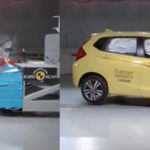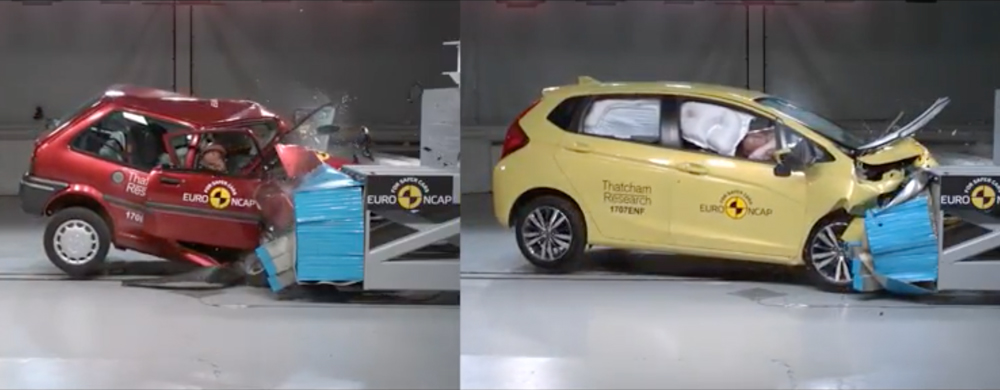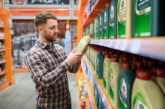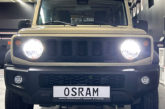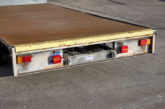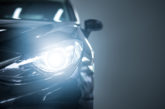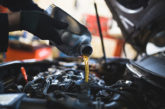First ever crash test & 2017 best-seller crashed side by side to reveal dramatic advances that have seen a 63% reduction in occupants killed or seriously injured
Shocking footage has been released to demonstrate just how far car safety has come in the twenty years since official crash testing began, by repeating its first ever crash test – of the Rover 100 – alongside today’s equivalent, the Honda Jazz.
In 1997 the Rover 100’s performance was so dire it was removed from the market. Rigorous crash-testing & research ever since has helped to revolutionise safety standards – a current Honda Jazz now gets a 5-star rating.
MORE than 15,000 lives have been saved on UK roads – and a further 78,000 across Europe – since revolutionary Euro NCAP car safety tests were launched 20 years ago.
The tests, introduced in February 1997 and in the face of fierce motor industry opposition, exposed hidden dangers in top-selling family cars, forcing a fundamental rethink in the way vehicles were designed to prevent accidents and save lives. Twenty years on, 9 out of 10 cars sold on the European market hold a Euro NCAP rating.
Today, as the results of a crash-test between two family cars built 20 years apart (a 1997 Rover 100 and a 2017 Honda Jazz) underline major advances in vehicle safety, Thatcham Research, the voice of Euro NCAP in the UK, estimates that advances driven by rigorous testing have delivered a 63 per cent reduction in car occupants killed and seriously injured, from 23,000 in 1997 to 8,500 in 2015.
In addition, over the same period the number of pedestrians and cyclists killed or seriously injured has fallen by 40 per cent, from 14,500 in 1997 to 8,500 in 2015.
Demanding safety as standard
Thatcham Research is marking the 20th anniversary by urging consumers to further boost Britain’s road safety record by making a commitment to buy only models with a five star Euro NCAP rating and a collision avoidance technology like AEB and Lane Assist systems. They also called on manufacturers to make AEB (Autonomous Emergency Braking) standard fitment, to prevent thousands of accidents.
The call came as Thatcham Research, which conducts Euro NCAP tests in the UK, estimated that if AEB that can sense cars, pedestrians and cyclists became standard on every new car sold in the UK, it would save 2,700 pedestrian and cyclist deaths and serious injuries every year. Over 20 years, this would mean 54,000 fewer.
“As we mark 20 years at the forefront of road safety, we are very proud that Euro NCAP’s programme of safety tests has achieved major, life-saving improvements in cars and has helped Europe reach the lowest road fatality rate for any region in the world,” said Euro NCAP’s Secretary General, Mic.

